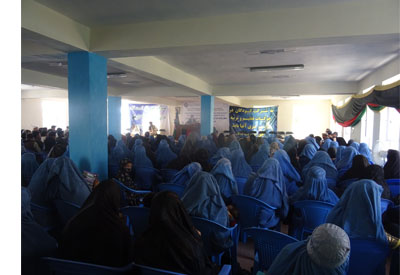CRDSA has accomplished implementing of the project titled” Resilience Building of Afghan Returnees, IDPs and host families in Afghanistan” on Sep 15 2016 in Farah, Ghor and Badghis provinces western Afghanistan. The project had been funded by Bureau of Population, Migration and Refugees (BPRM), Department of State for financial year 16 Sep 2015 to 15 Sep 2016. The project was completed successfully and all objectives and expected results related 3 components of the project were achieved.
1st Component of Project: Vocational Training/Livelihood support:
a. 770 beneficiaries including 570 female and 200 male completed the vocational training courses based on NSDP curricula within 6 months of training periods in Farah , Ghor and Badghis
b. 770 beneficiaries including 320 female and 450 male completed livelihood support programs on agriculture wheat cultivation, greenhouse, Animal husbandry, beekeeping and Soya bean cultivation in Farah, Ghor and Badghis
c. 1540 beneficiaries received their toolkits after completion of the program in three target provinces
d. 1540 beneficiaries completed basic literacy program and BDS training incorporated with vocational training livelihood support in three target provinces
e. 1210 beneficiaries out of 1540 total beneficiaries were linked to market and demonstrated increase incomes as their incomes were recorded in three target provinces
2nd Component of the project: WASH
Under this component following achievements were obtained
a. 35 tube wells including 20 tube wells in Farah and 15 wells in Ghor were drilled, aproned and hand pumps were installed
b. 35 water users committees including 20 committees in Farah and 15 committees in Ghor with 10% participation of women were established to maintain the well and installments
c. 1050 families including 600 families in Farah and 450 families in Ghor received hygiene education sessions
d. 1050 Families Hygiene kits including 600 kits in Farah and 450 kits in Ghor were distributed to the beneficiaries
e. Mortality and morbidity rate of children under 5 years old and women were declined due to accessibility to safe drinking water and hygiene promotion in target areas( according to Farah and Ghor provincial Hospitals)
f. A pipe scheme network was constructed in Badghis. this network included one deep well with depth of 80 meters, one reservoir with capacity of 150 cubic meter (150000 lit), 4 kilo meter plumping with multi sourced energy for pumps ( Solar panels and Generator). The pipe scheme facilities was surrounded by walls protected by barbed wire and fence to prevent irrelevant movement/entrances
g. The pipe scheme provided safe drinking water for 800 families in Badghis which had never accessed to safe drinking water before in the area.
h. A total of 800 families received hygiene education sessions facilitated by two community mobilizers/hygiene educators in Tagab Esmaile village in Badghis
i. A total of 800 families hygiene kits were distributed to the beneficiaries in Tagab Esmaile village in Badghis
j. One Water User committee was established to contribute the pipe scheme maintenance and collaboration with Water Supply Department to continue functioning of the network with 25% of female participation.
3rd component of the Project: Returnees Rights protection
Under this component following accomplishments/achievements were obtained
a. In Ghor Province, 1200 persons (400 families) received returnees’ rights/ GBV prevention awareness sessions in Ghor within 6 months of program. A total of 61 GBV cases were identified and 52 cases were addressed by legal/psychological counseling. 4 government departments ( DoE, DoPH, Municipality and Electricity) were advocated to improve services for returnees and IDPs
b. In Badghis province, 1200 persons (400 families) received returnees’ rights/ GBV prevention awareness sessions in Ghor within 6 months of program. A total of 19 GBV cases were identified and all 19 cases were addressed by legal/psychological counseling. 4 government departments (DoE, DoPH, Municipality and Water Supply) were advocated to improve services for returnees and IDPs.
c. In Farah Province, 1200 persons (400 families) received returnees’ rights/ GBV prevention awareness sessions in Ghor within 6 months of program. A total of 120 GBV cases were identified and 101 cases were addressed by legal/psychological counseling. 4 government departments ( DoE, DoPH, Municipality and DRRD) were advocated to improve services for returnees and IDPs

